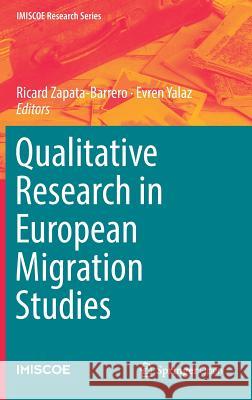Qualitative Research in European Migration Studies » książka



Qualitative Research in European Migration Studies
ISBN-13: 9783319768601 / Angielski / Twarda / 2018 / 302 str.
Qualitative Research in European Migration Studies
ISBN-13: 9783319768601 / Angielski / Twarda / 2018 / 302 str.
(netto: 191,66 VAT: 5%)
Najniższa cena z 30 dni: 192,74
ok. 16-18 dni roboczych.
Darmowa dostawa!
This open access book covers the main issues, challenges and techniques concerning the application of qualitative methodologies to the study of migration.
"It has an impressive list of authors ... . mix of chapters with different methods and research designs makes the scope of the volume quite wide. ... an interesting and useful book. ... Overall, the edited volume is a useful read for any student or scholar planning to start a new research project. ... thus easily available, I predict the book will find its way onto the curricula of many study programmes of the field of migration studies." (Saara Koikkalainen, Nordic Journal of Migration Research NJMR, Vol. 11 (3), 2021)
Chapter 1: Introduction – Preparing the Way for Qualitative Research in Migration Studies.- Chapter 2: Mapping the Qualitative Migration Research in Europe: An Exploratory Analysis: Evren Yalaz, Ricard Zapata Barrero.- Part I: Theoretical and Epistemological Issues: Chapter 3: Context-based Qualitative Research and Multi-Sited Migration Studies in Europe: Russell King.- Chapter 4: Moving out of the Comfort Zone: Promises and Pitfalls of Interdisciplinary Migration Research in Europe: Maren Borkert.- Chapter 5: Applied Political Theory and Qualitative Research in Migration Studies: Ricard Zapata Barrero.- Chapter 6: Epistemological Issues in Qualitative Migration Research: Self-reflexivity, Objectivity and Subjectivity: Theodoros Iosifides.- Chapter 7: Qualitative Migration Research: Viable Goals, Open-Ended Questions, and Multidimensional Answers: Ewa Morawska.- Chapter 8: Categorising What We Study and What We Analyse, and the Exercise of Interpretation: Dirk Jacobs.- Chapter 9: Where, What and Whom to Study? Principles, Guidelines and Empirical Examples of Case Selection and Sampling in Migration Research: Karolina Barglowski.- Chapter 10: The Interview in Migration Studies: A Step towards a Dialogue and Knowledge Co-production?: Olena Fedyuk, Violetta Zentai.- Chapter 11: Focus Groups in Migration Research: A Forum for “Public Thinking”?: Annalisa Frisina.- Chapter 12: Participant Observation in Migration Studies: An Overview and Some Emerging Issues: Paolo Boccagni, Mieke Schrooten.- Chapter 13: Discourse and Migration: Teun A. van Dijk.- Chapter 14: Doing Digital Migration Studies: Methodological Considerations for an Emerging Research Focus: Koen Leurs,Madhuri Prabhakar.- Part IV: Significant Requirements before Embarking: Chapter 15: Methodological and Ethical Dilemmas in Research among Smuggled Migrants: Ilse van Liempt, Veronika Bilger.- Chapter 16: Research-policy Relations and Migration Studies: Peter Scholten.- About the authors.
This open access book covers the main issues, challenges and techniques concerning the application of qualitative methodologies to the study of migration. It discusses theoretical, epistemological and empirical questions that must be considered before, during, and after undertaking qualitative research in migration studies. It also covers recent innovative developments and addresses the key issues and major challenges that qualitative migration research may face at different stages i.e. crafting the research questions, defining approaches, developing concepts and theoretical frameworks, mapping categories, selecting cases, dealing with concerns of self-reflection, collecting and processing empirical evidence through various techniques, including visual data, dealing with ethical issues, and developing policy-research dialogues. Each chapter discusses relative strengths and limitations of qualitative research. The chapters also identify the main drivers for qualitative research development in migration studies. It is a unique volume as it brings together a multidisciplinary perspective as well as illustrations of different issues derived from the research experience of the recognized authors. One additional value of this book is its geographic focus on Europe. It seeks to explore theoretical and methodological issues that are raised by distinctive features of the European context. This volume will be a useful reference source for scholars and professionals in migration studies and in social sciences as well. The publication is also addressed to graduate and post-graduate students and, more generally, to those who embark on the task of doing qualitative research for the first time in the field of migration.
1997-2026 DolnySlask.com Agencja Internetowa
KrainaKsiazek.PL - Księgarnia Internetowa









